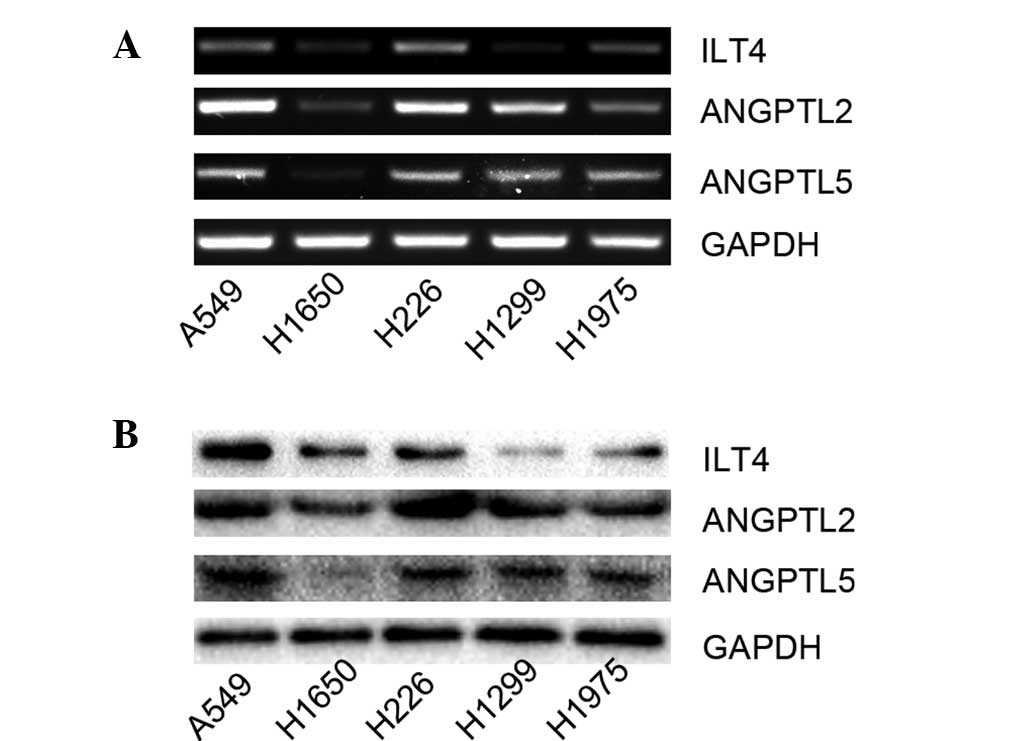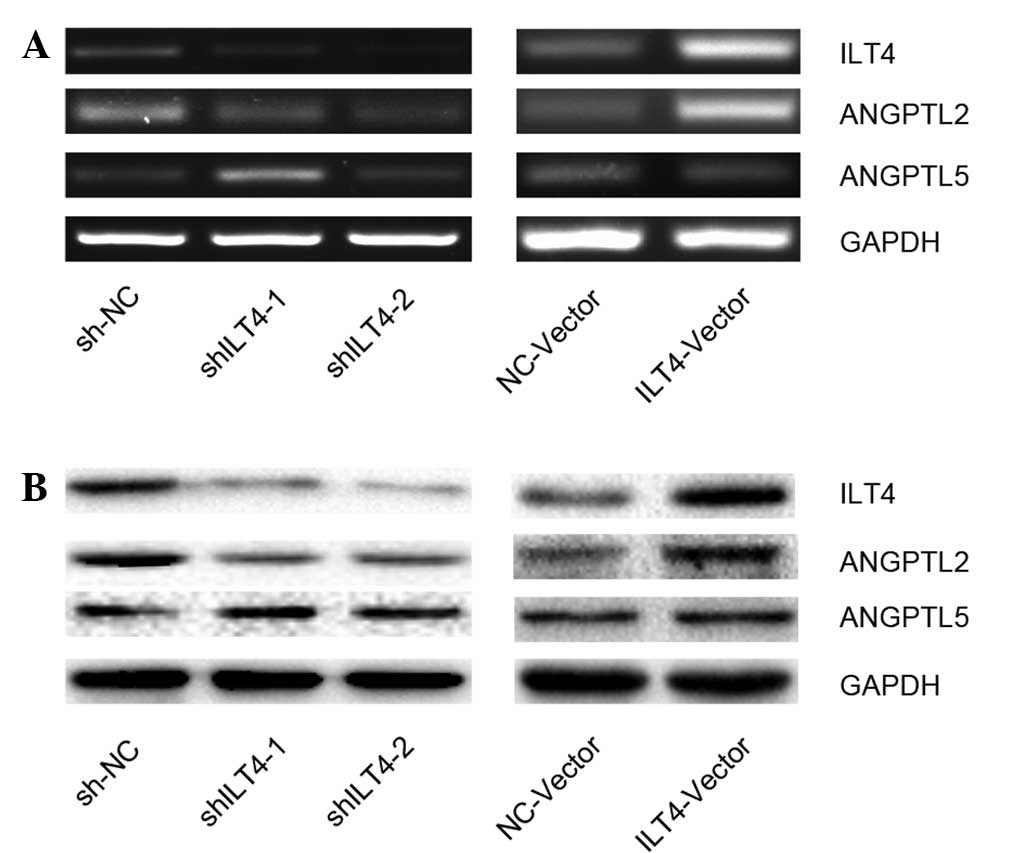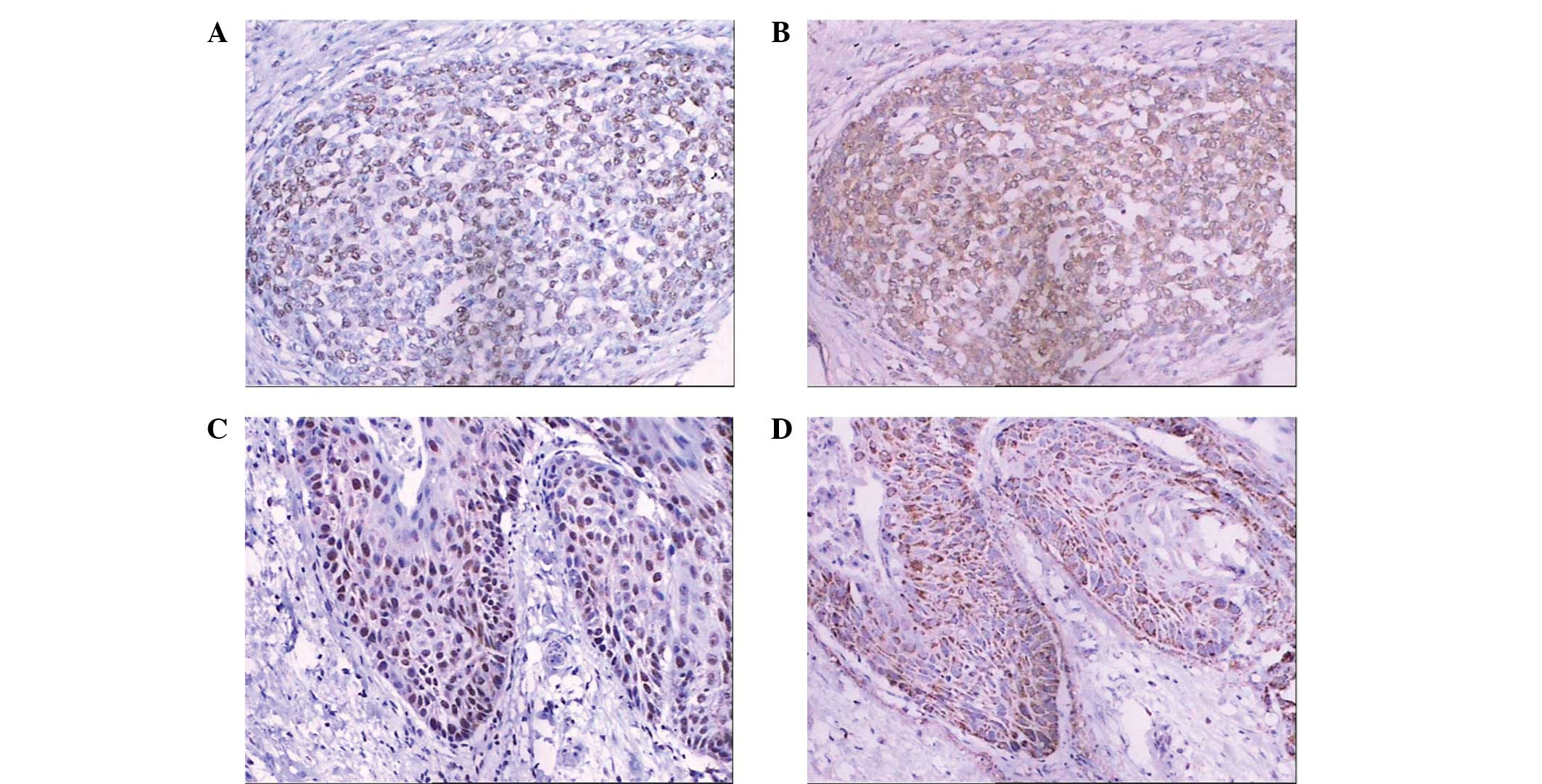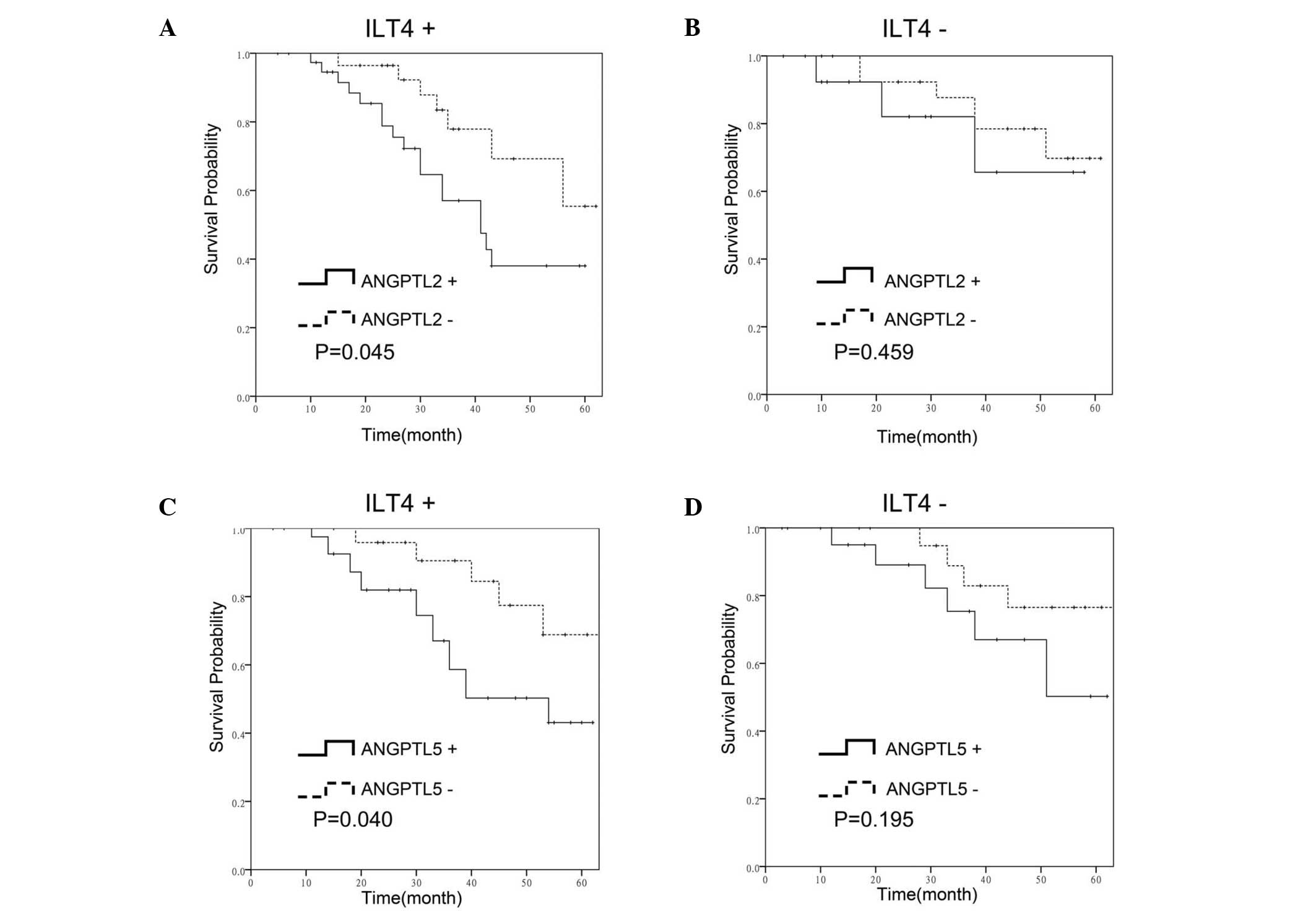|
1
|
Postmus PE: Chemotherapy for non-small
cell lung cancer: the experience of the Lung Cancer Cooperative
Group of the European Organization for Research and Treatment of
Cancer. Chest. 113(Suppl): 28S–31S. 1998. View Article : Google Scholar : PubMed/NCBI
|
|
2
|
Fanger NA, Cosman D, Peterson L, Braddy
SC, Maliszewski CR and Borges L: The MHC class I binding proteins
LIR-1 and LIR-2 inhibit Fc receptor-mediated signaling in
monocytes. Eur J Immunol. 28:3423–3434. 1998. View Article : Google Scholar : PubMed/NCBI
|
|
3
|
Borges L and Cosman D: LIRs/ILTs/MIRs,
inhibitory and stimulatory Ig-superfamily receptors expressed in
myeloid and lymphoid cells. Cytokine Growth Factor Rev. 11:209–217.
2000. View Article : Google Scholar : PubMed/NCBI
|
|
4
|
Colonna M, Samaridis J, Cella M, et al:
Human myelomonocytic cells express an inhibitory receptor for
classical and nonclassical MHC class I molecules. J Immunol.
160:3096–3100. 1998.PubMed/NCBI
|
|
5
|
Colonna M, Navarro F, Bellón T, et al: A
common inhibitory receptor for major histocompatibility complex
class I molecules on human lymphoid and myelomonocytic cells. J Exp
Med. 186:1809–1818. 1997. View Article : Google Scholar
|
|
6
|
de Waal Malefyt R, Haanen J, Spits H, et
al: Interleukin 10 (IL-10) and viral IL-10 strongly reduce
antigen-specific human T cell proliferation by diminishing the
antigen-presenting capacity of monocytes via downregulation of
class II major histocompatibility complex expression. J Exp Med.
174:915–924. 1991. View Article : Google Scholar : PubMed/NCBI
|
|
7
|
Lepin EJ, Bastin JM, Allan DS, et al:
Functional characterization of HLA-F and binding of HLA-F tetramers
to ILT2 and ILT4 receptors. Eur J Immunol. 30:3552–3561. 2000.
View Article : Google Scholar
|
|
8
|
Riteau B, Rouas-Freiss N, Menier C, Paul
P, Dausset J and Carosella ED: HLA-G2, -G3, and -G4 isoforms
expressed as nonmature cell surface glycoproteins inhibit NK and
antigen-specific CTL cytolysis. J Immunol. 166:5018–5026. 2001.
View Article : Google Scholar : PubMed/NCBI
|
|
9
|
Manavalan JS, Rossi PC, Vlad G, et al:
High expression of ILT3 and ILT4 is a general feature of
tolerogenic dendritic cells. Transpl Immunol. 11:245–258. 2003.
View Article : Google Scholar : PubMed/NCBI
|
|
10
|
Sun Y, Liu J, Gao P, Wang Y and Liu C:
Expression of Ig-like transcript 4 inhibitory receptor in human
non-small cell lung cancer. Chest. 134:783–788. 2008. View Article : Google Scholar : PubMed/NCBI
|
|
11
|
Zheng J, Umikawa M, Cui C, et al:
Inhibitory receptors bind ANGPTLs and support blood stem cells and
leukaemia development. Nature. 485:656–660. 2012. View Article : Google Scholar : PubMed/NCBI
|
|
12
|
Tabata M, Kadomatsu T, Fukuhara S, et al:
Angiopoietin-like protein 2 promotes chronic adipose tissue
inflammation and obesity-related systemic insulin resistance. Cell
Metab. 10:178–188. 2009. View Article : Google Scholar : PubMed/NCBI
|
|
13
|
Zhang CC, Kaba M, Ge G, et al:
Angiopoietin-like proteins stimulate ex vivo expansion of
hematopoietic stem cells. Nat Med. 12:240–245. 2006. View Article : Google Scholar : PubMed/NCBI
|
|
14
|
Hato T, Tabata M and Oike Y: The role of
angiopoietin-like proteins in angiogenesis and metabolism. Trends
Cardiovasc Med. 18:6–14. 2008. View Article : Google Scholar : PubMed/NCBI
|
|
15
|
Oike Y, Yasunaga K and Suda T:
Angiopoietin-related/angiopoietin-like proteins regulate
angiogenesis. Int J Hematol. 80:21–28. 2004. View Article : Google Scholar : PubMed/NCBI
|
|
16
|
Aoi J, Endo M, Kadomatsu T, et al:
Angiopoietin-like protein 2 is an important facilitator of
inflammatory carcinogenesis and metastasis. Cancer Res.
71:7502–7512. 2011. View Article : Google Scholar : PubMed/NCBI
|
|
17
|
Sasaki H, Suzuki A, Shitara M, et al:
Angiopoietin-like protein ANGPTL2 gene expression is correlated
with lymph node metastasis in lung cancer. Oncol Lett. 4:1325–1328.
2012.PubMed/NCBI
|
|
18
|
Kikuchi R, Tsuda H, Kozaki K, et al:
Frequent inactivation of a putative tumor suppressor,
angiopoietin-like protein 2, in ovarian cancer. Cancer Res.
68:5067–5075. 2008. View Article : Google Scholar : PubMed/NCBI
|
|
19
|
Teicher BA: Searching for molecular
targets in sarcoma. Biochem Pharmacol. 84:1–10. 2012. View Article : Google Scholar : PubMed/NCBI
|
|
20
|
Endo M, Nakano M, Kadomatsu T, et al:
Tumor cell-derived angiopoietin-like protein ANGPTL2 is a critical
driver of metastasis. Cancer Res. 72:1784–1794. 2012. View Article : Google Scholar : PubMed/NCBI
|
|
21
|
Drake AC, Khoury M, Leskov I, et al: Human
CD34+ CD133+ hematopoietic stem cells
cultured with growth factors including Angptl5 efficiently engraft
adult NOD-SCID Il2rγ−/− (NSG) mice. PLoS One. 6:e183822011.
View Article : Google Scholar
|
|
22
|
Khoury M, Drake A, Chen Q, Dong D, Leskov
I, et al: Mesenchymal stem cells secreting angiopoietin-like-5
support efficient expansion of human hematopoietic stem cells
without compromising their repopulating potential. Stem Cells Dev.
20:1371–1381. 2011. View Article : Google Scholar :
|
|
23
|
Miida T and Hirayama S: Impacts of
angiopoietin-like proteins on lipoprotein metabolism and
cardiovascular events. Curr Opin Lipidol. 21:70–75. 2010.
View Article : Google Scholar
|
|
24
|
Sobin LH, Gospodarowicz MK and Wittekind
C: TNM Classification of Malignant Tumors. 7th edition. John Wiley
& Sons; Hoboken, NJ: 2009
|
|
25
|
Huang XF, Han J, Hu XT and He C:
Mechanisms involved in biological behavior changes associated with
Angptl4 expression in colon cancer cell lines. Oncol Rep.
27:1541–1547. 2012.PubMed/NCBI
|
|
26
|
Marchiò S, Soster M, Cardaci S, et al: A
complex of α6 integrin and E-cadherin drives liver metastasis of
colorectal cancer cells through hepatic angiopoietin-like 6. EMBO
Mol Med. 4:1156–1175. 2012. View Article : Google Scholar
|
|
27
|
Hato T, Tabata M and Oike Y: The role of
angiopoitin-like proteins in angiogenesis and metabolism. Trends
Cardiovasc Med. 18:6–14. 2008. View Article : Google Scholar : PubMed/NCBI
|
|
28
|
Sporn MB and Roberts AB: Autocrine growth
factors and cancer. Nature. 313:745–747. 1985. View Article : Google Scholar : PubMed/NCBI
|


















